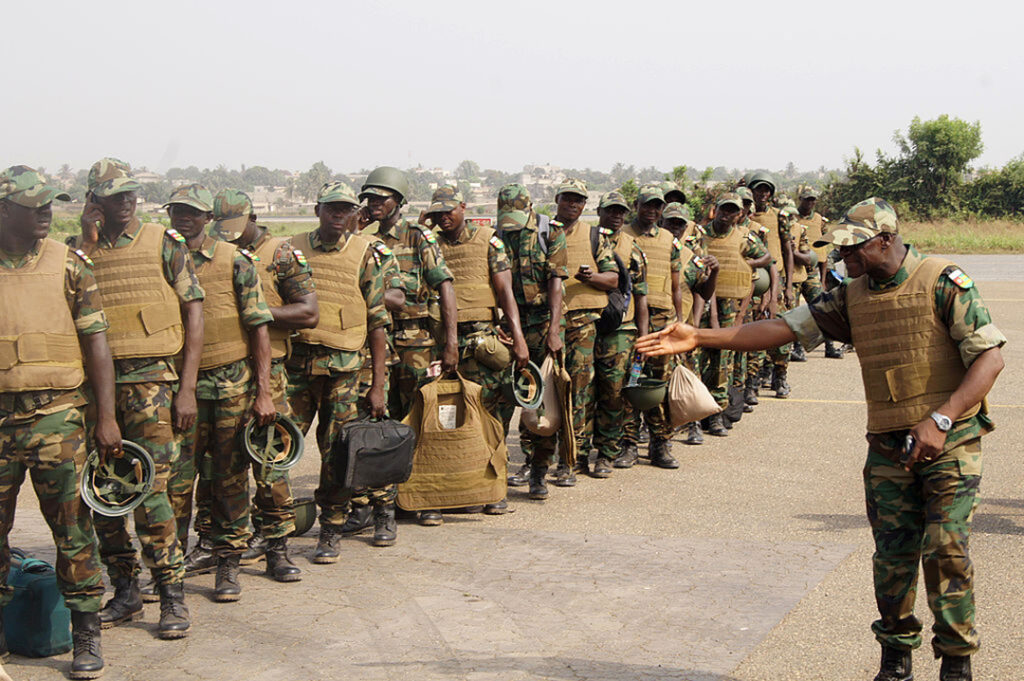ADF STAFF
Security experts have warned for several years that the extremist violence engulfing the Sahel inevitably would spread south to the coast.
Four countries along the Gulf of Guinea — Benin, Côte d’Ivoire, Ghana and Togo — responded by collaborating on regional security and moving some of their defense forces to the north, near the borders with Burkina Faso and Mali.
One after another, however, the coastal countries are seeing their fears realized.
In 2021, there were 13 Islamist militant attacks in Côte d’Ivoire, five in Benin and one in Togo, according to Armed Conflict Location & Event Data Project (ACLED) data. In 2019, there were no militant attacks in those countries.
“It does look like the jihadists have the aim of getting to the sea,” Ghanaian Armed Forces Brig. Gen. Felicia Twum-Barima told reporters during the annual United States military-led Exercise Flintlock, held in Côte d’Ivoire in February 2022.
“I’m not surprised that they’re here, but the speed is alarming.”
This year saw Togo added to the expanding list of countries hit by extremist violence.
Early in the morning of May 11, dozens of heavily armed terrorists on motorcycles attacked a military post in Kpendjal prefecture in northern Togo, just a few kilometers from the border with Burkina Faso. They killed eight Soldiers and wounded 13.
The attack included a coordinated ambush of army reinforcements after their convoy struck an improvised explosive device (IED) on the road to the military post.
It wasn’t the first attack by Islamist militants in Togo’s history. That came in November 2021. But the May attack was the first deadly terror attack on Togolese soil.
In November, Togo authorities said armed militants crossed the border from Burkina Faso into the Kpendjal prefecture and were repelled.
“The terrorist threat is real, and the pressure is very strong,” Togolese President Faure Gnassingbé said during a recent trip to the north. “We feel it a little more each day.”
After the attack in May, one of the world’s largest databases of terrorist groups, the Terrorism Research & Analysis Consortium, said it likely was perpetrated by Jama’a Nusrat al-Islam wa al-Muslimin (JNIM), a Sahelian affiliate linked to al-Qaida.
“The question is why these attacks have begun and what they imply for peace and security in the region,” security analyst Folahanmi Aina wrote for The Conversation Africa.
“Having closely monitored the conflict and security dynamics of West Africa for over a decade, I am convinced the attacks have to do with the need of violent extremist organizations to establish a presence in Togo as part of a broader recruitment drive.”
Togo’s neighbor to the east, Benin, has experienced a surge of attacks near its border with Burkina Faso. In April, five Soldiers were killed when their convoy hit an IED.
In February, a patrol organized by the nonprofit conservation group African Parks hit a series of IEDs, killing five park rangers, one park official, one Soldier and a French trainer and wounding 10 others. Two days later, another IED hit a Benin army commando team, killing one.
Côte d’Ivoire has had at least 17 incidents, including fierce gun battles and roadside bombs, in the north linked to JNIM, according to ACLED. The government has responded by moving a large number of troops there.
Ghanaian officials say they haven’t seen any incidents inside their country. Attacks, however, have taken place just a few kilometers to the north, across the border with Burkina Faso.
The May attack in Togo put Ghana on high alert.
“We cannot sit and fold our arms, thinking that all is well. All is not well, and we need to prepare. We need to be vigilant,” Deputy Defense Minister Kofi Amankwa-Manu told JoyNews TV. “Talk of Togo, Benin, Nigeria, Burkina Faso, Mali, Niger — they’ve all experienced this bitter pill from these extremists. We are the only country left standing.
“When you look at the southward movement of these groupings, clearly, one thing is obvious — they’re looking to find a coastal country.”

